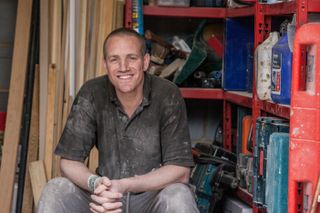I'm a builder and these are the questions to ask before hiring a tradesman
Homebuilding & Renovating's resident builder Andy Stevens explains how to avoid hiring the wrong builder for your project, and how to avoid problems before they emerge

Figuring out how to avoid using the wrong builder on your project can be a daunting task, especially if you're new to the process. We all know that having a positive relationship with your construction team is crucial for the success of your build (especially when you're putting the fate of your dream home into their hands).
But not all builders are experienced in all kinds of construction, and some tradespeople might not be as qualified as they first seem. So, what are the tell-tale signs to know and what can you do about rogue trades?
Award-winning builder, Andy Stephens has the inside intel on how tofind a builderfor your project and we asked him to share his top tips for finding the perfect match for your project.
1. Do you feel good in your gut about this builder?
Trust your gut instinct when meeting a potential builder for the first time. A very worrying sign is if a builder can start your project straight away. Depending on the specific trade, decent contractors will be booked up 3-6 months in advance.
Admittedly there could be a good reason such as delays on other jobs or with planning. But if they just happen to be conveniently and suddenly free, don't hesitate to ask why.
You can also ask to have a look at the job they are currently working on. You can even ask to speak to the client they’re currently working for. A good builder will only be too happy to answer such questions and share their previous projects.
2. Has the builder tackled projects of your size before?
Look for a builder with experience working on a project of a similar size to yours. This may sound obvious but many trades will over-ambitiously take on a job of which they have no experience or qualification to soundly complete. For example, if they fit kitchens for a living, can they successfully undertake your double storey extension and loft conversion?
Some other key questions to ask are:
- Do they employ or contract the right tradespeople to carry out the work?
- Are they aware of all the latest building regulations?
- Will they know what stages of the project to involve the building inspector?
- Are their electricians and plumbers self-certified to sign off their work?
- Do they have the correct insurance?
- Do they fully understand all the health and safety elements?
- Are they aware of CDM (Construction (Design and Management) Regulations)?
It may seem like a vast amount of information to research, but it all exists for a good reason and it’s all in your benefit; you want your project to run smoothly with minimal issues and have the beautiful end product you desire.
3. Does the builder have the right experience?
☑ Trust your instincts: is the prospective builder polite, efficient and trustworthy?
☑经验:他们有过去projec的例子ts of a similar size and kind and style of your project?
☑ Knowledge: awareness of building regulations, planning, permitted development.
☑ Checks: builder availability, subcontractor contact, insurance cover, health and safety.
☑ Paperwork: contract, deposit, payment and works schedules, liability and warranties.
☑ Maintain a positive relationship through regular and open comms and meetings.
Your type and style of project is also crucial to finding the right builder for the job. If you have a Grade II listed property or live in a conservation area, are they the correct contractors to take on work in these kind of surroundings? Try to ascertain if they have all the necessary experience and knowledge to make sure everything is built as it should be in areas with extra planning restrictions on permitted developments.
It's also worth remembering that some tradespeople will have a specific specialism. A good multi-tradesperson and builder will be able to do most things with a competent level of experience but there are some jobs which should be left to a specialist.
Trades such as thatching are exceptionally specialised and difficult for anyone other than an experienced dedicated thatcher. Do not under any circumstances allow a general builder to undertake specialised work, even if they claim they can manage it! Ensure they are 100% competent for what they say they can undertake.

4. Will the builder agree to a contract?
Avoid hiring a builder who refuses to sign a contract. At the end of the day, contracts exist to protect both the clientandthe trade. Starting a project without one is ludicrous for both parties. So if a tradesperson refuses to engage with a contract of work, avoid them at all costs. On most reasonably sized residential projects, you should have the following paperwork:
The contractor should be provided with full drawings, building regulations drawings and structural calculations to both cost the project and to work from. Paperwork is crucial: spend as much time as necessary getting it all in place with your builder before work starts to ensure that the project runs as smoothly as possible.
5. Does the builder want a large deposit?
There isn’t a regulatory amount of what should be agreed as a fair deposit payment to a project builder and percentages do vary quite dramatically on factors such as the size of the build and the job duration. If a builder asks for a significant outlay as a deposit for a big build such as an extension or loft conversion, do be aware.
I have requested that 20% of the final bill clears in my account before starting a job. Such a job entails plant machinery, scaffolding, skips, miscellaneous set-up costs, plus materials to order. On a smaller job such as partial house decorating or fitting a boiler, the trade may ask for a 50% deposit, but this kind of figure is rare on larger jobs.
6. Is the builder polite and have they turned up?
Once you have hired your builder, when work begins on site, there are also a few things to consider. Are your contractors and subcontractors always on site? Are they polite? Do they have other jobs running at the same time and if so, have they explained this?
If they claim to be on site all day and haven’t appeared and don’t answer their phone, be aware. If this continues, question whether they are the right tradespeople for your project. If you have concerns, ask your contractor for a meeting to address your concerns.
Remember, this is your project and you have to be happy with everything. If things are starting to worry you, ask the contractor for a meeting to raise your concerns.
7. Do you need to terminate the contract?
如果你还没有happy following your meeting, you are within your rights to terminate the contract. This obviously depends on the specifics of your contract and the terms concerning termination of the work. But this should be avoidable and a very last resort as not many other trades will want to take on someone else’s half-finished job. A replacement trade will be reluctant as they have no knowledge of what has been done and the quality of work, meaning they wouldn’t want to provide their own warrant or assurance on the project.
Get the Homebuilding & Renovating Newsletter
Bring your dream home to life with expert advice, how-to guides and design inspiration, direct to your inbox.
Andy Stevens is a multiple award-winning builder who manages Surrey-based building companyEclipse Property Solutions; he specialises in new builds, extensions and loft conversions.
While he is still on the tools, he is also widely involved in the construction industry. He presents a show onFix Radioand hosts his own building podcast Build:It, as well as being a speaker at the Homebuilding & Renovating Shows.
Andy has sat on the Board of the Federation of Master Builders (London region) and was previously Vice President. He also works with construction charities and is an advocate for mental health in the industry.
- Gabriella DysonAssistant Editor
Most Popular
Bring your dream home to life with expert advice, how-to guides and design inspiration, direct to your inbox.
Thank you for signing up to Homebuilding. You will receive a verification email shortly.
There was a problem. Please refresh the page and try again.

